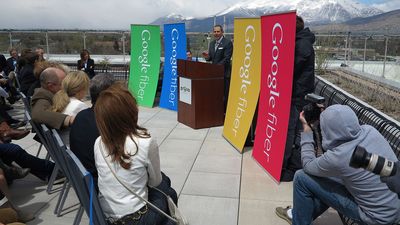Google Fiber Buying Webpass
The deal gives the Alphabet unit a foothold in apartments and businesses.

To take on the big internet service providers, Google Fiber is scooping up a small one.
On Wednesday, Google Fiber announced plans to acquire Webpass, a high-speed, fiber internet provider serving five cities. The deal, should regulators approve it, would be the first acquisition for the broadband unit under Alphabet and another signal of its ambition to become a competitive national player in the industry.
Google Fiber also made the deal to boost its efforts to deliver broadband internet wirelessly, an experimental tech it hopes will expand coverage at cheaper costs.
Financial terms were not disclosed. Webpass, a San Francisco-based company founded in 2003, is privately held. It only shares that it has customers in the “tens of thousands.”
But those subscribers are primarily where Google Fiber wants to be: Apartment complexes and businesses.
A big hurdle for Google Fiber’s expansion across cities is getting a foothold in large apartment buildings. Big broadband incumbents, like Comcast and Time Warner Cable, often sign multi-year deals locking their service into those buildings. Webpass has focused much of its residential business on apartments.
They’ve also focused on commercial offerings, providing internet — which ranges from 100 megabits per second to one gigabit per second — to businesses. Although Google Fiber began with laying pipes into homes, it has recently tried to ramp up its commercial offerings.
And Webpass would give Google Fiber subscribers in two new markets: Miami and Boston. Webpass also provides service in Chicago, San Diego and San Francisco, where Google Fiber has announced plans to expand.
Finally, Webpass has another asset that Google Fiber found attractive: It has paired its fiber network with wireless tech. Google Fiber wants to do the same thing, and started testing wireless services in Kansas City, its first market, earlier this year.
Google Fiber hasn’t shared its financial information. Alphabet execs have told Wall Street repeatedly that the unit accounts for the biggest costs (outside of Google).
Last year, those non-Google companies — dubbed the “Other Bets” — drained $869 million in capital expenditures and reported $448 million in revenue. Recode earlier reported that Google Fiber brought in roughly $100 million of that.
(18)


